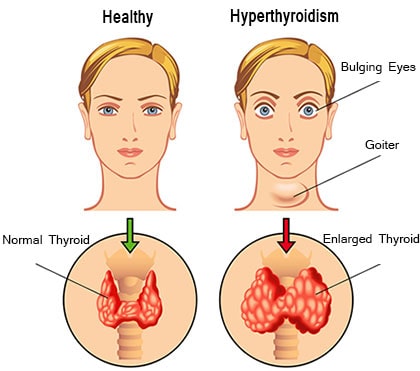
Hyperthyroidism
Thyroid disorder affects one in every twenty persons at some point in their lives. The thyroid gland secretes hormones that regulate blood pressure. It is a component of the endocrine system. Two lobes on either side of the windpipe make up the thyroid, directly below the larynx or Adam's apple. This gland is responsible for several essential metabolic functions, including growth and energy use.
Overview
The thyroid produces hormones that help regulate many functions in the body. When these hormones are overproduced, many bodily functions increase in speed. Thyrotoxicosis is a condition that occurs due to excessive thyroid hormone of any cause and therefore includes hyperthyroidism. Some Somehow, use the terms interchangeably. Signs and symptoms vary between people and may include irritability, muscle weakness, sleeping problems
Causes
• Graves' disease - The most common cause of hyperthyroidism (80% of cases) is autoimmune thyroid disease, also known as Graves' disease. This affects women more than men and is caused by the production of special proteins (antibodies) that attack the thyroid gland.
• Toxic thyroid nodules or nodules - The second most frequent cause of hyperthyroidism is toxic thyroid nodules or nodules.
• Thyroid inflammation - also known as thyroiditis - is a rare cause of hyperthyroidism typically caused by a viral illness that causes inflammation and tissue destruction of the thyresulting in the release of stored thyroid hormones.
• Drugs - Certain medications used to treat other conditions can cause hyperthyroidism. The most common is amiodarone, a medication used to treat irregular heartbeat. Other extremely rare causes of hyperthyroidism include benign pituitary gland tumors that produce an excess of thyroid stimulating hormone.
Symptoms
Irregular heartbeat.
Anxiety or irritation
Trembling of the hands
Symptoms may include weight loss, hot flashes hair loss, fingernail separation, and muscle weakness, particularly in the upper arms and thighs.
Loose or frequent bowel movements
Changes in the skin
Women may experience unexplained changes in their menstrual cycle, an increased risk of miscarriage, and irregular heartbeats.
Calcium loss from the bones causes decreased bone density.
Ayurvedic View
Galaganda- ati agni- Here gala refers to neck and ganda is a swelling resembling shape of button, filled bladder etc, the disease in which there is swelling in front of the neck hanging pendulously like a srotum, either big or small, or due to hormonal imbalance can affect digestion, cardiac, menstrual cycle, psychological health etc. this is hyperthyroidism. Ayurveda way of approach is to correct ati agni (metabolism), bring doshas back to prakruta awastha (balance state), reduce the symptoms and prevent the complications by ayurvedic panchakarma treatment and treatment done to correct the function.
Ayurvedic Treatments
Snehanam Shirodhara Kashaya dhara Lepanam Virechanam Nasyam Takra dhara Navara pinda swedanam Patra pinda swedanam
Naturopathy Treatments
Hip bath Enema Plantain leaf bath Mud therapy Neck Packs Reflexology Magnetotherapy Acupuncture Manipulative therapy Diet therapy Clinical yoga Cyclic meditation Mind sound resonance technique Pranayama
Hyperthyroidism
Treatment for
DISCLAIMER: Listed treatment details are only for information purposes. Treatments and duration may vary depending on numerous factors. Treatments for your condition may not be limited to this list.






















